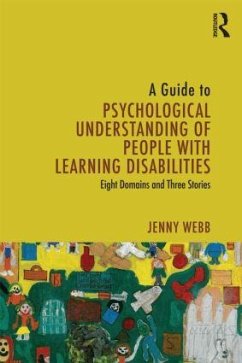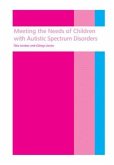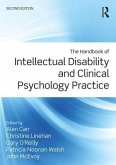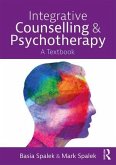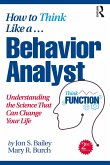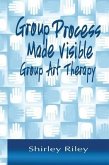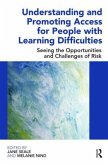Jenny Webb (Agency and UK. Access)
A Guide to Psychological Understanding of People with Learning Disabilities
Eight Domains and Three Stories
Jenny Webb (Agency and UK. Access)
A Guide to Psychological Understanding of People with Learning Disabilities
Eight Domains and Three Stories
- Broschiertes Buch
- Merkliste
- Auf die Merkliste
- Bewerten Bewerten
- Teilen
- Produkt teilen
- Produkterinnerung
- Produkterinnerung
This book provides the background information required to provide a basis for an inclusive and effective service for people with learning disability.
Andere Kunden interessierten sich auch für
![Meeting the needs of children with autistic spectrum disorders Meeting the needs of children with autistic spectrum disorders]() Rita Jordan (UK University of Birmingham)Meeting the needs of children with autistic spectrum disorders40,99 €
Rita Jordan (UK University of Birmingham)Meeting the needs of children with autistic spectrum disorders40,99 €![The Handbook of Intellectual Disability and Clinical Psychology Practice The Handbook of Intellectual Disability and Clinical Psychology Practice]() The Handbook of Intellectual Disability and Clinical Psychology Practice96,99 €
The Handbook of Intellectual Disability and Clinical Psychology Practice96,99 €![Integrative Counselling and Psychotherapy Integrative Counselling and Psychotherapy]() Basia SpalekIntegrative Counselling and Psychotherapy40,99 €
Basia SpalekIntegrative Counselling and Psychotherapy40,99 €![How to Think Like a Behavior Analyst How to Think Like a Behavior Analyst]() Jon BaileyHow to Think Like a Behavior Analyst43,99 €
Jon BaileyHow to Think Like a Behavior Analyst43,99 €![Group Process Made Visible Group Process Made Visible]() Shirley RileyGroup Process Made Visible47,99 €
Shirley RileyGroup Process Made Visible47,99 €![Coaching People with Asperger's Syndrome Coaching People with Asperger's Syndrome]() Bill GoodyearCoaching People with Asperger's Syndrome52,99 €
Bill GoodyearCoaching People with Asperger's Syndrome52,99 €![Understanding and Promoting Access for People with Learning Difficulties Understanding and Promoting Access for People with Learning Difficulties]() Understanding and Promoting Access for People with Learning Difficulties57,99 €
Understanding and Promoting Access for People with Learning Difficulties57,99 €-
-
-
This book provides the background information required to provide a basis for an inclusive and effective service for people with learning disability.
Produktdetails
- Produktdetails
- Verlag: Taylor & Francis Ltd
- Seitenzahl: 256
- Erscheinungstermin: 26. Juli 2013
- Englisch
- Abmessung: 234mm x 156mm x 14mm
- Gewicht: 404g
- ISBN-13: 9780415601153
- ISBN-10: 0415601150
- Artikelnr.: 37632607
- Herstellerkennzeichnung
- Libri GmbH
- Europaallee 1
- 36244 Bad Hersfeld
- gpsr@libri.de
- Verlag: Taylor & Francis Ltd
- Seitenzahl: 256
- Erscheinungstermin: 26. Juli 2013
- Englisch
- Abmessung: 234mm x 156mm x 14mm
- Gewicht: 404g
- ISBN-13: 9780415601153
- ISBN-10: 0415601150
- Artikelnr.: 37632607
- Herstellerkennzeichnung
- Libri GmbH
- Europaallee 1
- 36244 Bad Hersfeld
- gpsr@libri.de
Jenny Webb has worked with learning disabled people for more than 20 years. She is a Consultant Clinical Psychologist and is on the British Psychological Society Specialist Register of Clinical Neuropsychologists. She can be contacted through the consultancy Agency and Access, which is for the support of people whose intellectual impairments may render them vulnerable. www.agencyandaccess.co.uk jenny.webb@agencyandaccess.co.uk
Acknowledgements. Abbreviations. Introduction. Part One: Understanding the
Context. Chapter One: Defining the Construct of Learning Disability.
Chapter Two: the Scientific and Ethical Context. Chapter Three: the
Historical Context. Chapter Four: the Professional and Theoretical Context.
Chapter Five: the Legal Context. Part Two: Understanding the Person: Eight
Domains. Chapter Six: Starting to Understand the Person. Chapter Seven: the
Behavioural Domain. Chapter Eight: the Social Domain. Chapter Nine: the
Physical Domain. Chapter Ten: the Neurological Domain. Chapter Eleven: the
Cognitive Domain. Chapter Twelve: the Attachment Domain. Chapter Thirteen:
the Ecological Domain. Chapter Fourteen: the Inner World. Part Three:
Making Sense: Three Stories. Chapter Fifteen: Formulating a coherent
narrative. Chapter Sixteen: Conclusions . Appendices. Appendix One.
Appendix Two. Appendix Three.
Context. Chapter One: Defining the Construct of Learning Disability.
Chapter Two: the Scientific and Ethical Context. Chapter Three: the
Historical Context. Chapter Four: the Professional and Theoretical Context.
Chapter Five: the Legal Context. Part Two: Understanding the Person: Eight
Domains. Chapter Six: Starting to Understand the Person. Chapter Seven: the
Behavioural Domain. Chapter Eight: the Social Domain. Chapter Nine: the
Physical Domain. Chapter Ten: the Neurological Domain. Chapter Eleven: the
Cognitive Domain. Chapter Twelve: the Attachment Domain. Chapter Thirteen:
the Ecological Domain. Chapter Fourteen: the Inner World. Part Three:
Making Sense: Three Stories. Chapter Fifteen: Formulating a coherent
narrative. Chapter Sixteen: Conclusions . Appendices. Appendix One.
Appendix Two. Appendix Three.
Acknowledgements. Abbreviations. Introduction. Part One: Understanding the
Context. Chapter One: Defining the Construct of Learning Disability.
Chapter Two: the Scientific and Ethical Context. Chapter Three: the
Historical Context. Chapter Four: the Professional and Theoretical Context.
Chapter Five: the Legal Context. Part Two: Understanding the Person: Eight
Domains. Chapter Six: Starting to Understand the Person. Chapter Seven: the
Behavioural Domain. Chapter Eight: the Social Domain. Chapter Nine: the
Physical Domain. Chapter Ten: the Neurological Domain. Chapter Eleven: the
Cognitive Domain. Chapter Twelve: the Attachment Domain. Chapter Thirteen:
the Ecological Domain. Chapter Fourteen: the Inner World. Part Three:
Making Sense: Three Stories. Chapter Fifteen: Formulating a coherent
narrative. Chapter Sixteen: Conclusions . Appendices. Appendix One.
Appendix Two. Appendix Three.
Context. Chapter One: Defining the Construct of Learning Disability.
Chapter Two: the Scientific and Ethical Context. Chapter Three: the
Historical Context. Chapter Four: the Professional and Theoretical Context.
Chapter Five: the Legal Context. Part Two: Understanding the Person: Eight
Domains. Chapter Six: Starting to Understand the Person. Chapter Seven: the
Behavioural Domain. Chapter Eight: the Social Domain. Chapter Nine: the
Physical Domain. Chapter Ten: the Neurological Domain. Chapter Eleven: the
Cognitive Domain. Chapter Twelve: the Attachment Domain. Chapter Thirteen:
the Ecological Domain. Chapter Fourteen: the Inner World. Part Three:
Making Sense: Three Stories. Chapter Fifteen: Formulating a coherent
narrative. Chapter Sixteen: Conclusions . Appendices. Appendix One.
Appendix Two. Appendix Three.

